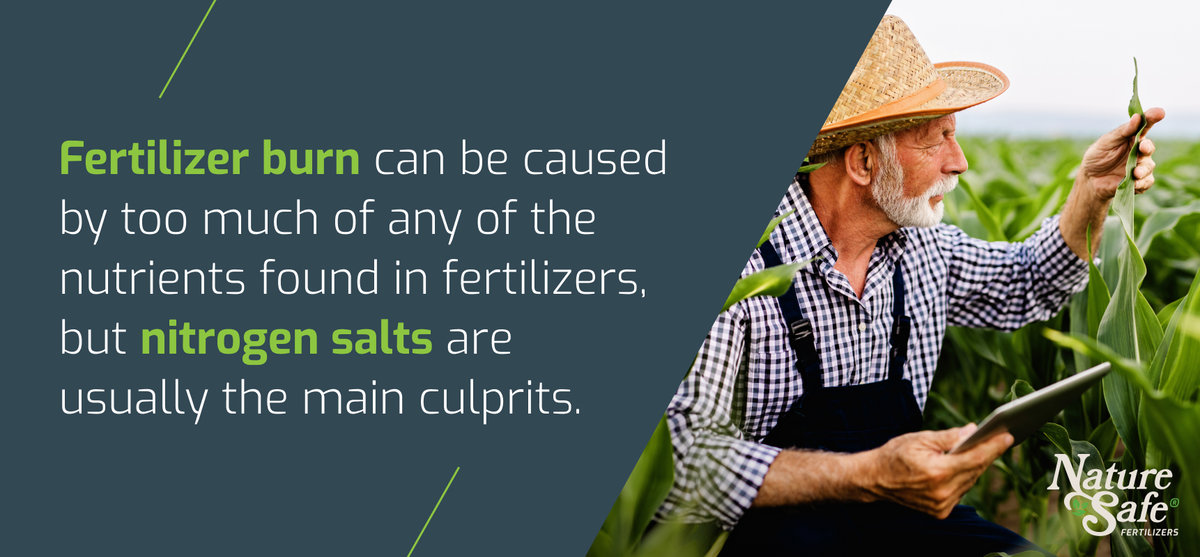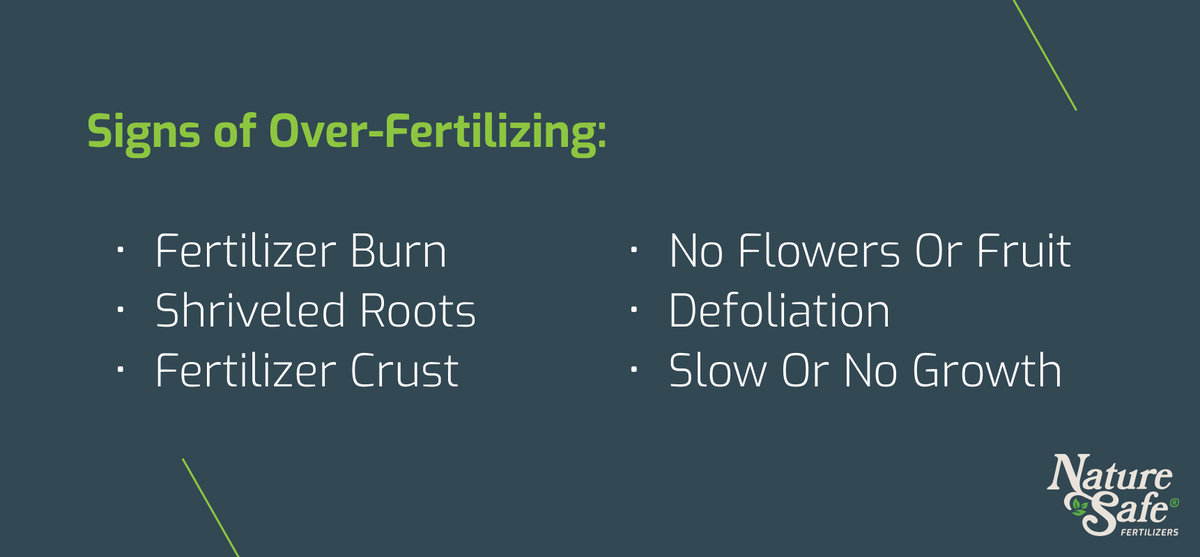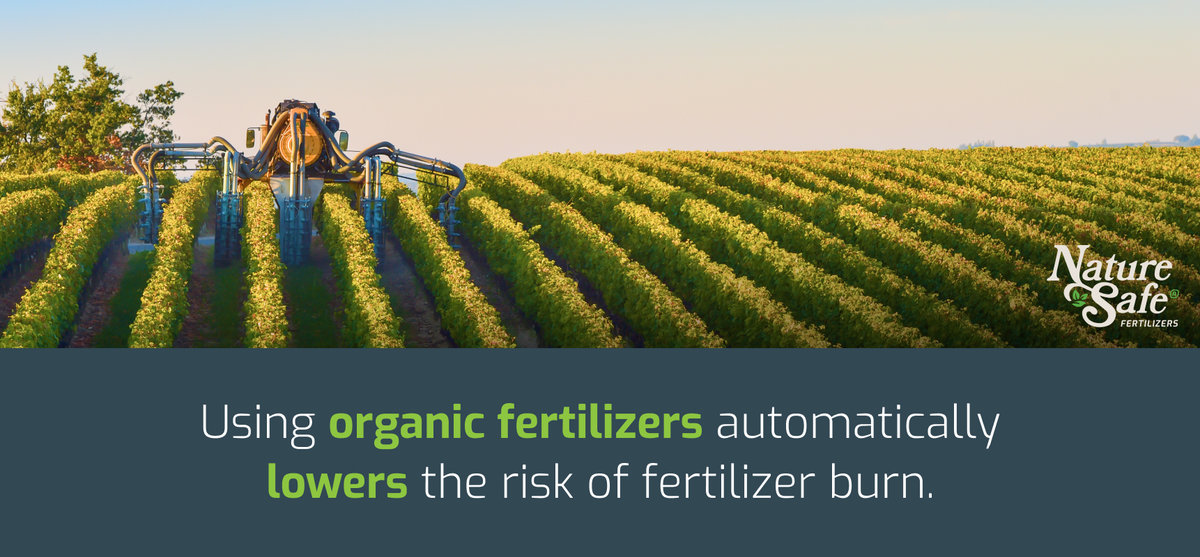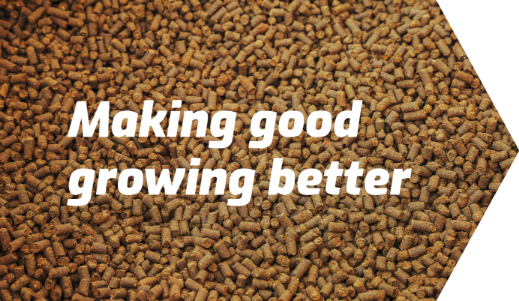
Fertilizer Burn and Other Signs of Over-Fertilizing
- Posted: Nov 10, 2022
- Author: Nature Safe Fertilizers
- Crop
All farmers and growers understand that occasional fertilization is the key to happy and profitable crops. It creates healthy soil that leads to healthy plants.
However, it is possible to have too much of a good thing. Fertilizers are useful—to a point. Past that point, they either become ineffective and a waste of money and effort, or they can even be harmful to your turf or crops.
Signs of Over-Fertilizing
Each crop and type of turf grass has their own unique needs in terms of when to fertilize and how much. You can find specific guidelines based on whether this is a planting year, type of soil, or what hardiness zone you’re planting in.
Some factors can disrupt a fertilizer from being effective, such as the amount of moisture the crops receive or how well-drained the soil is. These are a few signs that something has gone wrong and you might be over-fertilizing.
Fertilizer Burn
One of the most common signs of over-fertilization is fertilizer burn. You can identify it by dry, yellow or brown leaves and grass blades.
It’s caused by salts that remain in the soil after the water has drained or evaporated. If the proper amount of fertilizer is applied, these salts aren’t an issue.
However, once too much fertilizer is applied, they have less opportunity to disperse and move through the soil. These excess salts then draw moisture away from the roots, drying out and damaging the crops or turf. This can also occur if the fertilizer lands directly on the leaves of the plant.
Fertilizer burn can be caused by too much of any of the nutrients found in fertilizers, but nitrogen salts are usually the main culprits. The difficulty when identifying fertilizer and nitrogen burn, is that the symptoms often mimic a nutrient deficiency. If you have doubts of what your crops or grass need, test the soil.

Shriveled Roots
Another symptom of excess salt in the soil is that roots shrivel or diminish when they can’t get the moisture or nutrients they need. Because the roots are the first part of the plant to receive the nutrients, they are often the first thing to feel the effects of over-fertilization. Check the roots if you see fertilizer burn begin to set in, or if growth seems stunted.
Fertilizer Crust
Before your crops have shown outward effects, you might be able to see some signs of over-fertilizing in the soil itself—or rather, on the soil. Liquid and water-soluble fertilizers should be absorbed into the soil with moisture. If the ratio is off, and there are too many solids to enter the soil, the fertilizer may sit on top.
This is a pretty extreme indication of too much fertilizer, and usually only occurs in smaller operations. However, it’s never a bad idea to keep your eyes out, as it could also be an indication of under-watering.
No Flowers Or Fruit
Nitrogen-rich fertilizers are usually applied early in growth stages as nitrogen promotes growth of stems and foliage. Too much nitrogen too late in the growth stages can lead to too much foliage and no flowers or fruits.
One study found that heavy application of high-nitrogen fertilizers can delay or prevent flower growth. This can leave the crop and its products vulnerable to autumn frosts.
Defoliation
Falling leaves is also an indication of too much salts left in the soil from fertilizers. Without sufficient moisture—and, therefore regulated access to nutrients—parts of the plant may wilt and fall. The earliest signs of defoliation often occur in the lower leaves.
Slow or No Growth
Plants won’t put energy into growing if it doesn’t have access to the resources that it needs, so a crop might halt growth until it does. Slow growth or no new growth can be an indicator of under fertilization as well. You should refrain from fertilizing again until you’ve checked the soil.

How To Fix Over-Fertilization
Luckily, most over-fertilization is fixable, especially when it comes to rehabilitating plants that have suffered from fertilizer burn.
The first step is usually to overwater crops or turf grass. This will dissolve the soluble salts, and redistribute them away from the roots. This process must be done with a balanced approach, however, as some soils don’t drain water effectively enough, and overwatering can create its own problems.
If the scale of your farm allows for it, pruning the yellowing or brown leaves can save the rest of the plant. If you notice a crust of fertilizer around certain plants you can remove that crust manually.
Keep Fertilizer Burn From Happening
Of course, the best offense is a good defense. Preventing over-fertilization is more ideal than fixing it.
Test Your Soil
If there are any doubts as to the nutrient content of your soil, send samples to a professional soil testing service. They will send results back indicating exactly where you are lacking nutrition or have certain minerals in over-abundance.
Organic Fertilizer
Simply using organic fertilizers can help prevent over-fertilization. Yes, it’s still possible to flood crops and turf with nutrients, but it’s far less likely.
For starters, the ingredients of organic fertilizers are derived from plants and animal by-products, meaning little-to-no soluble salts. Using organic fertilizers automatically lowers the risk of fertilizer burn.
The composition of organic fertilizers makes their release slower and easier to control. This means that the nutrients make it to the roots and soil organisms over a longer period of time. Thus, the plant has time to process the nutrients, and won’t be overwhelmed by an excess of fertilizer, since everything is made available at a slow and steady rate.

Choose Nature Safe
Nature Safe Organic Fertilizers creates products to improve overall soil health. When the soil is healthy, crops and turf grass are, too. Prevent over-fertilization with our slow-release formulas, so there are no hiccups in your growing season. Call us today, and let us help you make good growing better.
